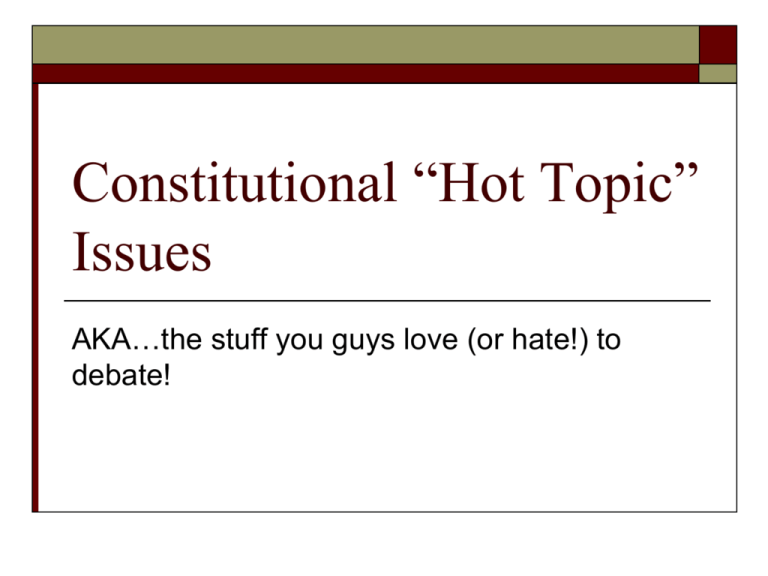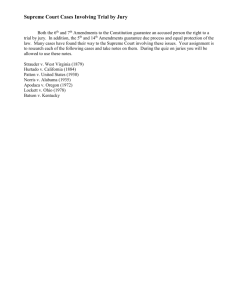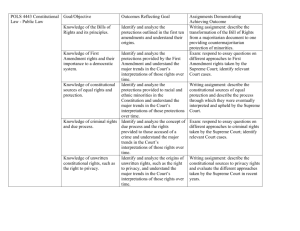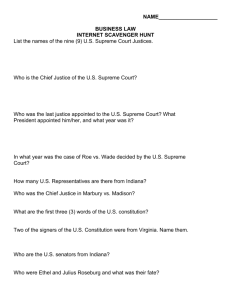Constitutional *Hot Topic* Issues
advertisement

Constitutional “Hot Topic” Issues AKA…the stuff you guys love (or hate!) to debate! Associated Amendments (see handout) 1st = Freedom of religion, speech, of the press, and right of petition 2nd = Right of people to bear arms not to be infringed 4th = Persons and houses to be secure from unreasonable searches and seizures 5th = Trials for crimes; just compensation for private property taken for public use 8th = Excessive bail, fines, and punishments prohibited 9th = Reserved rights of people. 10th = Powers not delegated, reserved to states and people respectively 14th = Citizenship defined; privileges of citizens (life, liberty, etc) Issue I: Pro-Life v. Pro-Choice Overview: Abortion refers to the voluntary termination of a pregnancy, resulting in the death of the fetus or embryo. Abortions performed prior to the third trimester are legal in the United States. Pro-choice groups believe that a woman should have access to whatever health care she needs and that she should have control over her own body. Pro-life groups believe that the embryo or fetus is "alive" and thus abortion is tantamount to murder. Constitutional issue of state intervention: to what degree should the state have a say in a pregnancy? Court Cases Roe v. Wade (1973) Abortion was legalized when the U.S. Supreme Court ruled that during the first trimester landmark decision rested on the "right to privacy" the Court ruled that the state could intervene in the second trimester and could ban abortions in the third trimester a central issue, which the Court declined to address, is whether human life begins at conception, at birth, or at some point in between Casey v. Planned Parenthood (1992) The Court overturned Roe's trimester approach and introduced the concept of viability Today, approximately 90% of all abortions occur in the first 12 weeks. Associated Amendments 14th (privacy/life) 9th (privacy/unenumerated rights) 10th (states’ rights) Issue II: Same-sex Marriage The Defense of Marriage Act, or DOMA, is the short title of a federal law of the United States passed on September 21, 1996. The law has two effects: No State need treat a relationship between persons of the same sex as a marriage, even if the relationship is considered a marriage in another state. The Federal Government need not treat same-sex relationships as marriages for any purpose, even if concluded or recognized by one of the states. The bill was passed by Congress by a vote of 85-14 in the Senate and a vote of 342-67 in the House and was signed into law by President Bill Clinton on September 21, 1996. Court Cases Griswold v. Connecticut (1965) the Supreme Court ruled that a state's ban on the use of contraceptives violated the right to marital privacy The case had nothing to do with gay marriage rights, but is used as a landmark case for expanding civil rights Extension to civil rights = Supreme Court's explicitly stated that unenumerated rights have full constitutional status Several justices agreed that marital privacy is a "fundamental right" right to privacy = "fundamental" when it concerns the actions of married couples, because marriage "is of such a character that it cannot be denied without violating those fundamental principles of liberty and justice which lie at the base of our civil and political institutions." Associated Amendments 1st (freedom of expression/religion) 14th (privacy/life/equality) 9th (privacy/unenumerated rights) 10th (states’ rights) Issue III: Gun Rights v. Gun Control Overview gun rights: The belief that any legislation to curtail the use and sale of firearms is an infringement on Americans' constitutional rights gun control: The belief that the United States needs stricter firearm laws, including tougher background checks Court Cases United States v. Miller. (1939) unanimous opinion where the court upheld a federal prosecution for transporting a sawed-off shotgun. A Federal District Court had ruled that the provision of the National Firearms Act the defendants were accused of violating was barred by the Second Amendment Supreme Court disagreed and reinstated the indictment. Brady Handgun Violence Prevention Act: (1994) imposes a five-day waiting period and background check before a licensed gun importer, manufacturer, or dealer can sell or deliver a handgun to an unlicensed individual; in 1998, a new background-check system allowed checks to be done over the phone or electronically The Supreme Court (June 2008) supported the view that the Second Amendment protects an individual right to own a gun for personal use ruling 5 to 4 that there is a constitutional right to keep a loaded handgun at home for self-defense overturned the District of Columbia ban on handguns, the strictest guncontrol law in the country Associated Amendments 2nd (bear arms) 9th (right to privacy) 14th (privileges as citizens, right to property) Issue IV: Medical Marijuana PRO: Overview: In 1972 marijuana was placed in Schedule I of the Controlled Substances Act = the US government considers it to have "no accepted medical use in treatment in the United States." 13 of 50 US states currently have approved the medical use of marijuana for qualified patients. has "accepted medical use in treatment in the US" would easily meet the FDA criteria over "whether a new product's benefits to users will outweigh its risks." safe and effective treatment for dozens of conditions, such as cancer, AIDS, multiple sclerosis, pain, migraines, glaucoma, and epilepsy. CON: has not been FDA-approved because it is too dangerous to use various FDA-approved drugs make the use of marijuana unnecessary is addictive, leads to harder drug use, injures the lungs, harms the immune system, damages the brain, interferes with fertility, impairs driving ability, and sends the wrong message to kids Court Cases U.S. v. Oakland Cannabis Buyers’ Co-op: (1998) The Federal Justice Department challenged California's Proposition 215 (passed in 1996), The US government filed a lawsuit to cease OCBC (and similar groups) operations. In a unanimous decision, the U.S. Supreme court ruled that marijuana may NOT be distributed to persons who prove a medical necessity for the drug The court's decision affirms an existing federal law that classifies marijuana as an illegal substance and offers no medical exceptions The ruling does not address or change existing state laws dealing with marijuana It does mean, however, that marijuana users and distributors cannot use medical necessity as a defense against prosecution at the federal level Associated Amendments 14th (privacy) 9th (privacy/unenumerated rights) 10th (states’ rights) 8th (cruel and unusual) Commerce Clause (supporters) Supremacy Clause (opponents) Issue V: Right to Die (euthanasia and physician-assisted suicide) PRO: Proponents believe it is the compassionate choice is supported by the same constitutional safeguards that guarantee such rights as marriage, procreation, and the refusal or termination of life-saving medical treatment CON: Opponents worry about a "slippery slope" from euthanasia to murder, arguing that any test to determine between voluntary and non-voluntary cases will prove faulty fear that legalizing euthanasia will unfairly target the poor and disabled, groups with little access to advanced, possibly life-saving medical care Court Cases Washington v Glucksburg (1997) Harold Glucksberg, MD, brought a lawsuit challenging the state of Washington's ban on physician-assisted suicide. The suit asserted that the Washington ban was unconstitutional, arguing that the right to “liberty” provided in the Fourteenth Amendment District Court ruled that the ban was unconstitutional, and the Ninth Circuit agreed The U.S. Supreme Court, in a 9-0 decision, reversed, finding that the ban on physician-assisted suicide does NOT violate the Fourteenth Amendment Gonzales v. Oregon (2006) In 1994, Oregon passed the Death with Dignity Act, a state law permitting physicians to prescribe lethal doses of controlled substances to terminally ill patients. In 2001, U.S. Attorney General John Ashcroft declared that the Act violated the Controlled Substances Act of 1970 Oregon sued the Attorney General in federal district court The district court and the Ninth Circuit both held that Ashcroft's directive was illegal The U.S. Supreme Court, in a 6-3 opinion, held that the Controlled Substances Act did not authorize the Attorney General to ban the use of controlled substances for physician-assisted suicide Associated Amendments 14th (privacy/liberty) 9th (privacy/unenumerated rights) 10th (states’ rights) 8th (cruel and unusual) Issue VI: Death Penalty Overview: The United States executed 1,057 people from 1977 through 2006 primarily by means of lethal injection. Although not exclusive to murder - the death penalty can be applied for treason, espionage, and other crimes - the majority of cases involve the execution of people who have killed others. CON: no deterrent effect on crime wrongly gives governments the power to take human life making them no better than the murderers they execute perpetuates social injustices by disproportionately targeting people of color (racist) and people who cannot afford good attorneys (classist) creates a system whereby innocent people are sometimes executed. PRO: important tool for preserving law and order deters additional crime thereby saving innocent lives costs less than life imprisonment life - even in prison - is a privilege that some people should not have Court Cases Trop v. Dulles (1958) The Supreme Court decided, 5-4, that it was unconstitutional for the government to cancel the citizenship of a U.S. citizen as a punishment because of the the 8th Amendment’s prohibition on “cruel and unusual punishment” In the dissenting opinion, a justice noted, "Is constitutional dialectic so empty of reason that it can be seriously urged that loss of citizenship is a fate worse than death?" Furman v. Georgia (1972) Furman was discovered burglarizing a home. When attempting to escape, his weapon went off and killed a resident in the house. He was convicted of murder and sentenced to death. Two other death penalty cases were decided along with Furman: Jackson v. Georgia and Branch v. Texas. These cases deal with the constitutionality of the death penalty for rape and murder convictions The US Supreme Court held that the imposition of the death penalty in these cases constituted cruel and unusual punishment and violated Constitutional rights. Court Cases Cont… Gregg v. Georgia (1976) Gregg was found guilty of armed robbery and murder and then sentenced to death by a Georgia grand jury. On appeal, the Georgia Supreme Court upheld the death sentence. Gregg challenged his death sentence for murder at the US Supreme Court, claiming that his capital sentence was a 'cruel and unusual' punishment in violation of the Eighth and Fourteenth Amendments The Court rejected the claim and upheld the sentence Roper v. Simmons (2005) was a decision in which the U.S. Supreme Court held that it is unconstitutional to impose capital punishment for crimes committed while under the age of 18 overruled the Court's prior ruling upholding such sentences on offenders above or at the age of 16 Associated Amendments 8th (cruel and unusual) 14th (right to life)



